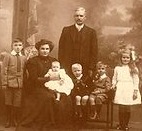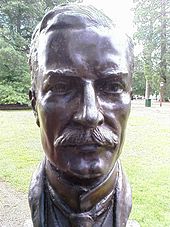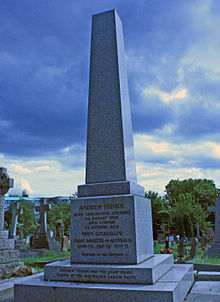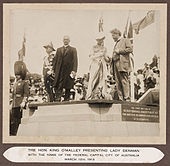The boy from Crosshouse.
- Jacqueline Heron Wray

- Mar 2, 2019
- 7 min read
Updated: Feb 1
On Friday 29th of August 1862, Jane Garven, who was married to Robert Fisher, gave birth to a baby boy in the mining village of Crosshouse in Ayrshire. Jane, born in 1833, was the daughter of a blacksmith and had worked as a domestic servant before her marriage to Robert. At that time Jane and Robert lived in Orr’s Land in Crosshouse which ran along the Carmel Water behind the main street in the village (looking towards Kilmaurs Road)
Robert Fisher was born in Dundonald, in 1833. He came from a long line of strong-minded coal miners. Robert was a noteworthy figure in the local community and was the leader of the temperance society in Crosshouse. In 1863, he co-founded a cooperative society with ten other miners. The co-operative went on to develop a library and reading room in Crosshouse. Allegedly, Robert’s father had once been left homeless along with his wife and five children because of his involvement in the miners’ union.
The baby born that day in 1862 was named Andrew. He had one older brother. Four more brothers and two sisters followed, although, sadly, one of his sisters died in 1879 aged just 10 years.
The Fisher family lived in a miner’s row in Crosshouse. A collier’s abode was typically a room and kitchen. A small square lobby allowed access into the cottage through the front door. Candles and perhaps an oil lamp was used at night. It had a fireplace and a small, open fire cooking range which may have been little more than some metal grates set over the burning embers of coal. The floor consisted of compacted earth, and the families living in the row fetched water from a pump in the street. There was a privy in the back yard which was simply a fixed wooden seat with a hole in it, suspended over a cesspit dug into the ground, and enclosed by a simple structure to provide privacy and protection from the elements. The door to the privy had a gap at the top and bottom to allow air to circulate helping to alleviate bad smells! Ash from the fire in the cottage was utilized in the privy to cover up and deodorize the human excrement. The Fishers, like everyone else at that time, would have used a chanty (chamber pot) at night to avoid traipsing out into the cold in their nightclothes. There would most likely have been a bed set into the wall enclosed by a curtain. There was a press (cupboard) for storage, but generally storage space was sparse, and every nook and cranny was utilized to store the family's meager possessions and provisions.
With everyone in the village using coal to cook and keep warm, the atmosphere outside was decidedly sooty and smoky although much less so than in cities and towns.
Andrew had a normal childhood for the time and place, he fished for’ beardies’, sticklebacks, and eels in Carmel Water with his friends and enjoyed walking and playing in the surrounding countryside, he even helped to form a local football team. Andrew and his siblings attended several different schools in and around Crosshouse. There had been a school in Crosshouse since 1705. A new school was built on Gatehead Road in 1848 at the cost of £408 10s 6d. The standard of education at that time was high, the Crosshouse schoolmaster had received formal training in Edinburgh. Andrew later attended night school in Kilmarnock. He was known to have a speech impediment and was almost deaf in one ear, said to have been caused by being kicked in the head by a cow on one of his walks! It is not known exactly how old Andrew was when he left school, he may have been any age between nine and thirteen. (In later years he was thought to have been embarrassed by his lack of education}
Andrew began working in the local coal mine when he left school, it is commonly acknowledged that he started out as a trapper. The trapper’s job (given to the youngest children who worked there) was to open and close the wooden trap doors that allowed fresh air to flow through the mine. Andrew, like all the other trappers, would have sat in total darkness for up to twelve hours at a time waiting to let the coal cart through the door. He then progressed to working with the pit ponies and finally moved to the coal face and the heavy pick and shovel work. At the age of sixteen, after he had been given some training, he was promoted to the significant position of air-pump operator in the mine.
Andrew’s father suffered from Coal workers’ pneumoconiosis (CWP) more commonly known as black lung disease, caused by long-term exposure to coal dust. He gave up mining and became manager of the Crosshouse cooperative food store which meant that the family had to move out of miners’ row. They moved to the nearby village of Kilmaurs.
The family returned to Crosshouse and leased a small farm there. In 1881 the Fishers lived in the Ladywell Toll House on Gatehead Road. Andrew’s father went on to work as a gardener and apiarist. He was only fifty-three when he died of lung disease.
Andrew and one of his younger brothers decided to go to Australia in 1885 following a series of poignant events.
Andrew had been elected secretary of the Crosshouse branch of The Ayrshire Miners Union in 1879. He was seventeen. After his involvement in a ten-week strike which resulted in a small pay rise for the miners, and not the 10 percent requested, he lost his job. He was a supporter (like many miners) of the Liberal party led by Gladstone, particularly the Liberal-Labour. He chaired a meeting in Crosshouse in support of the Representation of the People Act 1884, also known as the Third Reform Bill. The following year he was involved in another strike, this time he was sacked and blacklisted! After this, he felt that Scotland could not provide him with the opportunities and changes he was desperately looking for, so he set his sights in Australia.
Following their arrival in Brisbane on the 17th of August 1885, after two months on board a ship that had sailed from London, Andrew and his brother James followed in the footsteps of other Scottish miners and made their way to Burrum River Coalfields. Andrew eventually became a mine manager, having assisted in sinking a new mine shaft at Torbanlea. He moved to the gold mining town of Gympie in 1888 and helped to form the Gympie branch of the Amalgamated Miners Association. In Gympie he resided in a boarding house and it was there he met, and eventually married, his landlady’s daughter, Margaret Irvine. He was a founding member of the Gympie cooperative and helped to establish a forerunner of The Labour Party. In 1882 he represented Gympie at the Labour in politics Convention in Brisbane.
Andrew Fisher went on to become Prime Minister of Australia from 1908 to 1909, from 1910 to 1913, and from 1914 to 1915. He was the leader of the Labour Party from 1907 to 1915.
In October 1915, during the Great War (WW1) and at Andrews's request, a journalist reported on the situation in Gallipoli and told Andrew, “Your fears have been justified".
He described the Dardanelles Expedition as being
"A series of disastrous underestimations" and "One of the most terrible chapters in our history"
“What I want to say to you now very seriously is that the continuous and ghastly bungling over the Dardanelles enterprise was to be expected from such a general staff as the British Army possesses, the conceit and self-complacency of the red feather men are equalled only by their incapacity”
The report once in Andrew’s hands ultimately led to the evacuation of the Australian troops in December 1915. Andrew visited Australian troops serving in Belgium and France. The French Government awarded him with the ‘Legion d’honneur when the war ended, but he refused to accept it, he did not covet titles and decorations, he also declined a knighthood.
Andrew and his wife returned to London and in 1922 they bought a property near Hampstead Heath.
Sadly, by the time he was sixty, Andrew’s family and friends had noticed a decline in his mental faculties, probably the onset of dementia. It became unsafe for him to be out alone, and in 1925 his assets were placed in trust by his family. By 1928, he couldn’t sign his own name. He contracted a severe case of influenza in September of that year and died of complications on the 22nd of October, aged sixty-six.
Andrew never lost his Scottish accent, retaining a thick Scottish ‘brogue’ for the whole of his life.
Obituarists highlighted his modesty, integrity, and dedication to the labour movement, and praised him as "loyal to his class, courageous in the advocacy of their cause, and absolutely incorruptible"
He was buried at Hampstead Cemetery on the 26th of October 1928. A memorial service was held at St Columba’s Church in Knightsbridge, attended by representatives of King George V and Prime Minister, Stanley Baldwin. In 1930. Prime Minister Ramsay MacDonald unveiled a granite obelisk above Andrews's grave. Mrs. Fisher died in Australia in 1958. Andrew Fisher was one of Australia’s most successful politicians.
Andrew Fisher, and others like him, who felt so strongly about the deprivation and inequality endured by the working classes, committed themselves to improving conditions and rights. Andrew has left a legacy of reforms and development. Because of him, and so many other like-minded people, we enjoy a much safer, healthier, and more comfortable lifestyle today than the Fisher family did during the Victorian era.
Notes.
My Grandfather, James Heron, was part of the committee involved in the creation and erection of a commemorative cairn in Crosshouse in 1978 marking 50 years since Andrew Fishers death. It was unveiled on the 29th of August 1979, Andrews's birth date, by Sir Gordon Freeth, Australian High Commissioner. Peggy, the only surviving child of Andrew and Margaret was also in attendance. The brass plaques were engraved at Scottish Aviation Ltd.
One plaque reads:
'Erected by the people of Crosshouse in memory of the Rt Hon Andrew Fisher. Born here on 29th August 1862. Prime Minister of Australia 1908, 1910 & 1914. High Commissioner 1916-1921. Died London 22nd October 1928'
And the second plaque reads:
Australian Immigrant, Miner, Union Leader, Australian State and Federal Parliamentarian, three times Labour Party Prime Minister, who introduced much innovative legislation, he led his adoptive country with merit and dignity in war and peace. Australia Remembers'.
A commemorative stone stands outside The Andrew Fisher Library in Annandale Gardens Crosshouse.
Andrew's brothers: -
John Fisher became the Chief Constable of the Grimsby Police Force. Robert became the colliery manager of the Wellington Coal Company Ltd in British Columbia in Canada.
Andrew and Margaret had seven children John, Margaret (Peggy), James, Robert, Andrew, and Henry.
Jacqueline Heron Wray. 2019.
Books used during research
Heather Crichton Dunlop, Old Crosshouse, 2012
https://en.wikipedia.org/wiki/Andrew_Fisher
#crosshouse, #ayrshire,#ayrshirehistory, #crosshousehistory, #famouspeoplefromayrshire











Comentarios